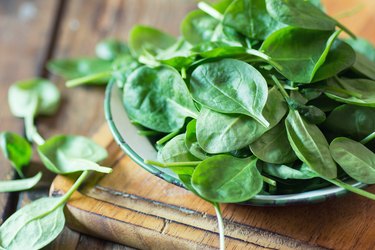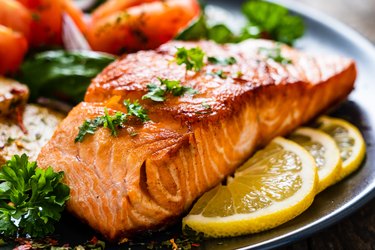
When it comes to keeping your sight sharp, what you eat matters. But forget bushels of carrots. The ideal meal to keep your peepers perfect, says an optometrist, is a dark leafy green salad topped with salmon.
Here's why this dish is a great way to care for your eyes, and what other foods you should be eating for better eye health.
Video of the Day
Video of the Day
1. It’s Packed With Carotenoids

Carotenoids are plant compounds that have antioxidant properties. Carrots are perhaps the most famous carotenoid-containing veggie. But while the crunchy orange veg is certainly good for you, dark green is actually where it's at for your eyes.
Lutein and zeaxanthin are the carotenoids to target for eye health, Kerry Gelb, OD, an optometrist in Woodbridge, New Jersey, who has a weekly podcast called Open Your Eyes, tells LIVESTRONG.com. These are the only carotenoids in the eye, per the American Optometric Association.
Lutein and zeaxanthin are found in abundance in dark leafy vegetables like spinach, kale, turnip greens, collards, dandelion greens and mustard greens, per Oregon State University.
Carotenoids are superb for your sight because they're some of the most powerful nutrients for protection against eye diseases like macular degeneration and cataracts, and they also may be somewhat protective against diabetic retinopathy," Dr. Gelb says. (Age-related macular degeneration is the leading cause of vision loss in people ages 50 and older, per the National Eye Institute. It causes blurry spots in your sight and can make straight lines look wavy.)
Lutein and zeaxanthin "protect the eye by absorbing blue light coming through your eye," Dr. Gelb says. They are also anti-inflammatory and protect against oxidative stress that damages your eyes over time, he adds.
You might be used to making salads, but next time, grab the darker greens in the store. Spinach and kale are obviously great, but now's also a good time to experiment with varieties that may be new to you, like dandelion or mustard greens.
Related Reading
2. It’s Chock-Full of Omega-3 Fatty Acids

Omega-3 fatty acids, which are abundant in fish, are also linked to a decrease in the risk of age-related macular degeneration, Dr. Gelb says. These omega-3s — which are polyunsaturated fatty acids — are linked to lower inflammation and oxidative stress, making them peeper-protective.
While taking fish oil supplements hasn't shown promise when it comes to reducing the risk of eye diseases, eating fish has. A November 2016 meta-analysis in Nutrients concluded that fish consumption was protective against macular degeneration in the short- and long-term.
Dr. Gelb recommends fatty fish like salmon and sardines. Tuna was also a big winner in the study, lessening the odds of the eye disease by 42 percent.
Don't like fish? Go for omega-3-rich eggs, which are produced when hens eat a diet enriched with flaxseed. Look on the front of the package to identify these eggs. (Bonus: Eggs also contain lutein.)
3. It’s Got a Lot of Vitamin C

Just one cup of spinach contains 7 milligrams of vitamin C, which is about 8 percent of your daily value, per the USDA. (Though you're definitely eating more than a cup in a salad.)
"Vitamin C is very good for your eyes," Dr. Gelb says, because it's a top-notch antioxidant.
In addition to the greens in your salad, add yummy C-packed toppers like strawberry slices or bell pepper pieces.
Alongside your salad, consider eating a fresh orange. Dr. Gelb points to July 2018 research from the Westmead Institute for Medical Research which found that people who ate at least one orange a day had a whopping 60 percent lower risk of developing late age-related macular degeneration 15 years later compared to orange-avoiders.
Oranges have both vitamin C and plant compounds called flavanones, Dr. Gelb says, both of which are anti-inflammatory and help protect blood vessel function.
- American Optometric Association: “Diet and Nutrition”
- Oregon State University: “Carotenoids”
- American Academy of Ophthalmology: “Retina”
- American Academy of Ophthalmology: “Macula”
- National Eye Institute: “Age-Related Macular Degeneration”
- Nutrients: “Fish Consumption and Age-Related Macular Degeneration Incidence: A Meta-Analysis and Systematic Review of Prospective Cohort Studies”
- USDA: “Spinach, raw”
- Westmead Institute for Medical Research: "An orange a day keeps macular degeneration away: 15-year study"
Is this an emergency? If you are experiencing serious medical symptoms, please see the National Library of Medicine’s list of signs you need emergency medical attention or call 911.